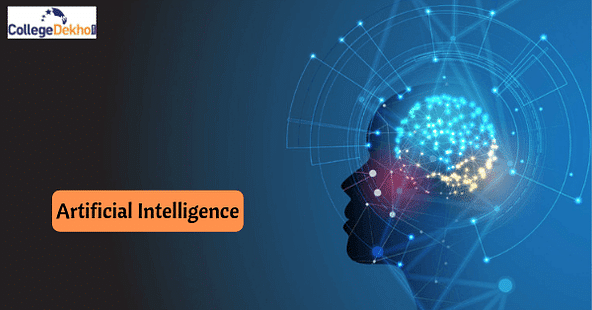Artificial Intelligence is a field that has a constantly increasing popularity and demand. Candidates who are interested in Artificial Intelligence (AI) courses can find all the details related to it in this article.
- What Is Artificial Intelligence?
- Artificial Intelligence Courses
- Artificial Intelligence Course Admission Procedure
- Artificial Intelligence Course Fees
- Best Artificial Intelligence Colleges in India
- Artificial Intelligence Course Syllabus
- Artificial Intelligence Career Options
- The Difference Between Artificial Intelligence (AI) and Machine Learning (ML)

What Is Artificial Intelligence?
Artificial Intelligence, abbreviated as AI, is the simulation of the processes of human intelligence by machines, particularly computer systems. It is an area of computer science which emphasises on the creation or formation of intelligent machines that react and work like human beings. The human intelligence processes that artificial intelligence simulates are learning, reasoning, self-correction, etc. AI acquires information and also the rules for using that information as a part of learning. It reasons by using those specific sets of rules for reaching definite or approximate conclusions. Some examples of Artificial Intelligence applications include speech recognition, expert systems, planning, learning, problem-solving, and machine vision. These are some of the activities for which computers are designed with Artificial Intelligence.
Artificial Intelligence, or AI, is a unique branch of computer science which aims solely at creating intelligent machines. In the last few years, Artificial Intelligence has become a highly important part of the technology industry. Many students are now willing to study Artificial Intelligence and make a career in this particular field. The demand for AI course has seen a significant increase in the past few years. The research that is associated with Artificial Intelligence is highly specialised and technical. Students pursue the courses to learn about the core problems of AI which include the programming of computer systems for traits like reasoning, knowledge, perception, problem-solving, planning, learning, ability to move and manipulate objects, etc.
Artificial Intelligence Courses
Due to the increasing demand for Artificial Intelligence, many AI courses have been started at various levels. However, Artificial Intelligence courses are still in the initial stages as it has surfaced recently. The importance of AI grew in leaps and bounds in the past few years which is why, in terms of education, Artificial Intelligence is in quite a nascent stage.
Witnessing the popularity and development of Artificial Intelligence, many institutions have come up with AI courses. Some of the premier institutes of India like IITs (Indian Institutes of Technology), NITs (National Institutes of Technology), IIMs (Indian Institutes of Management), etc. have introduced Artificial Intelligence courses in their curriculum. Not just the technical and scientific colleges and universities of the country, other educational bodies have also started AI courses. The courses of Artificial Intelligence come under various disciplines such as science, technology, mathematics, data science, neuroscience, computer studies, etc. Various institutes across the country offer graduate, postgraduate, diploma, and certificate level courses on Artificial Intelligence. Students can get a degree of Bachelor of Technology (B.Tech), Masters in Science (M.Sc), or Masters in Technology (M.Tech) with a specialisation in Artificial Intelligence. Apart from that, some colleges also conduct short term programs or distance learning courses of Artificial Intelligence. Candidates who are interested in pursuing Artificial Intelligence via any stream have several options to choose from as per their requirements and convenience.
Artificial Intelligence Course Admission Procedure
The admission process for Artificial Intelligence courses depends completely upon the college or institute from which the candidate is planning on pursuing the course. The admission procedures of each college differ from the other. Candidates will have to inquire about the Artificial Intelligence course admissions from the respective colleges they seek admission in. The basic admission procedure of AI courses requires the interested candidates to fill in the application forms and register themselves for the course within the time slot given by the college or institute. The candidates then have to produce their documents for verification by the college authorities to be considered eligible for the course. Some institutes conduct entrance tests to gauge the knowledge of candidates before admitting them to the Artificial Intelligence courses. The candidates must go through the eligibility criteria and instructions given by the respective college or institute before applying for the AI courses offered by it. Most of the institutes conduct the admissions in the online mode which makes it fairly easy for candidates to complete the procedure.
Artificial Intelligence Course Fees
The fees of Artificial Intelligence courses depends upon the level of the course opted by the candidate. Another factor responsible for deciding the course fee of Artificial Intelligence programmes is the college or institute that is offering it. Candidates interested in enrolling themselves in the AI courses of various colleges can check the fee of the programme and decide the institute and level accordingly. An estimate of the fee structure for the Artificial Intelligence courses is given below for the reference of the interested candidates.
Level | Degree | Fee |
|---|---|---|
Certificate | Certificate in Artificial Intelligence | Rs. 20,000 to Rs. 60,000 |
Diploma | Diploma in Artificial Intelligence | Rs. 40,000 to Rs. 70,000 per year |
Undergraduate | Bachelor of Technology (B.Tech) | Rs. 1 lakh to Rs. 1.5 lakhs per year |
Postgraduate | Masters in Science (M.Sc) | Rs. 60,000 to Rs. 1 lakh per year |
Postgraduate | Masters in Technology (M.Tech) | Rs. 1 lakh to Rs 2 lakhs per year |
The fee structure of various colleges offering AI courses varies because of several reasons. Candidates opting for online Artificial Intelligence courses have a different fee structure of the course as compared to the candidates choosing to attend the classroom learning sessions.
Best Artificial Intelligence Colleges in India
Many colleges in India have started with Artificial Intelligence courses as a part of their curriculum. The AI course encompasses various disciplines and streams which make it extremely convenient for a lot of institutes to launch AI courses. Some of the topmost colleges, universities, and institutes of the country offer artificial intelligence courses to their students on different levels. Some of the best Artificial Intelligence colleges in India are given here. Candidates can check their eligibility criteria and admission process if they are interested in pursuing the course from the colleges given below:
- Indian Institute of Technology, Bombay (IIT Bombay)
- University of Hyderabad (UoH)
- Indian Institute of Science, Bangalore (IISc Bangalore)
- Indian Institute of Technology, Madras (IIT Madras)
- Indian Statistical Institute, Kolkata (ISI Kolkata)
- Chandigarh University
- Indian Institute of Information Technology and Management, Trivandrum (IITMK)
- Amity University, Noida
Artificial Intelligence Course Syllabus
The syllabus of artificial intelligence can be as detailed as the candidates want it to be for studying. Depending upon the level of the AI course, the syllabus varies from college to college. The basic and most important topics of the entire syllabus of artificial intelligence are given below:
- Introduction to Artificial Intelligence
- Introduction to Intelligent Agents
- The History of Artificial Intelligence
- The Building of Intelligent Agents (logic, games, search, constraint satisfaction problems)
- Applications of Artificial Intelligence (Natural Language Processing, Vision/ Robotics)
- Machine Learning Algorithms
- Solving real Artificial Intelligence problems via programming with Python
- The Fundamentals of Programming
- The Foundation of Natural Language Processing
- Data Science
- Foundation of Machine Learning (ML)
- Machine Learning (in-depth)
- Feature Engineering, the Production, and Development of ML Models
- Machine Learning case studies (real world)
- Neural Network
- Data mining and Recommender Systems
- Deep Learning
- Computer Vision
- Deep Learning case studies (real world)
Artificial Intelligence Career Options
It is said that jobs and career options in the industry of artificial intelligence are estimated to witness an increase of 2.3 million positions by the end of the year 2030. Many companies that use Artificial Intelligence technologies have agreed to the fact that AI is contributing to the creation of new job opportunities and positions in the technology sector. The field of Artificial Intelligence is already being used for a vast variety of applications for the purpose of making smarter computers. Some of the Artificial Intelligence jobs that a candidate can apply for after completing a course in AI are provided here.
- Video Game Programmer
- Machine Learning Researcher
- Robotics Programmer
- Software Engineer
- Data Mining Analyst
- Working in the Military Services
- Machine Learning Engineer
- Data Scientist
- Business Intelligence Developer
- Research Scientist
- Big Data Engineer
- Big Data Architect
Some topmost companies such as Amazon, Facebook, Google, Microsoft, Uber, Lenovo, Samsung, IBM, Accenture, Intel, Adobe, etc. hire candidates who have specialisation in artificial intelligence on large scales. The scope of AI is increasing with great speed and many job opportunities have been opened for candidates with knowledge of AI.
The salaries of Artificial Intelligence professionals vary from position to position and company to company. The beginning salary of an AI expert in a top multinational company is around Rs. 90 lakhs per annum. The pay scale increases considering the knowledge, area of expertise, work experience, and other such important professional factors of a candidate.
The Difference Between Artificial Intelligence (AI) and Machine Learning (ML)
Artificial Intelligence (AI) and Machine Learning (ML) are often mentioned together which has created confusion in the minds of people about the difference between the two. These terms seem to have a usage in which they are plied interchangeably. Machine Learning (ML) and Artificial Intelligence (AI) are definitely not the same things as many people confuse them to be. It has been wrongly perceived by many individuals is that the work done by AI and ML are of similar patterns. The terms of Artificial Intelligence and Machine Learning crop up in high frequencies whenever the topics of Analytics and Big Data are being talked about and every time the broader waves of technological advancements and change sweep through the technical world as they have vital importance in these fields.
In simple terms, Artificial Intelligence (AI) is s broader concept of creating machines that are capable of carrying out tasks in such a way that people would generally consider “smart”. However, Machine Learning (ML) is a current application of Artificial Intelligence (AI) that is based around the idea that people should really just be able to give machines all the access to data and let the machines learn for themselves.
The primary aim of Artificial Intelligence (AI) is to function in a way that increases the chances of a higher success rate. It does not cater to the accuracy much. Whereas Machine Learning (ML) has its main focus on increasing accuracy and it does not consider the success rate. Artificial Intelligence works like a computer program that is designed to do smart work. Its goal is simulating natural intelligence in computer systems so as to make them capable of solving complex problems. Machine Learning is a simple concept in which the machine takes data and learns from it. The goal of ML revolves around learning from data on certain tasks in order to maximize the performance of the machine on that particular task.
The function of Artificial Intelligence is decision making while that of Machine Learning is learning new things from acquired data. AI leads to the development of a system that can mimic the human brain and respond and behave accordingly in a given circumstance. It is for finding the optimal solution. On the other hand, Machine Learning creates self-learning algorithms and does not see whether the solution is optimal or not. Artificial Intelligence functions on the footsteps of wisdom or intelligence and Machine Learning incorporates knowledge as the main feature of its performance.
Are you feeling lost and unsure about what career path to take after completing 12th standard?
Say goodbye to confusion and hello to a bright future!

Was this article helpful?




















Similar Articles
NIT GATE Cutoff 2025 - Check Previous Years' Cutoff, MTech Admission Process
GATE COAP 2025: Seat Allotment Round 5 (Out), Dates, Registration, Process
Madhya Pradesh M.E/M. Tech Admission 2025: Dates (Out), Eligibility Criteria, Application Form, How to Apply
BITSAT Slot Booking 2025 (Slot 2 June 16-17) - Direct Link, Process, How to Book
OJEE 2025 Marks Vs Rank Analysis
List of Engineering Colleges Accepting OJEE 2025